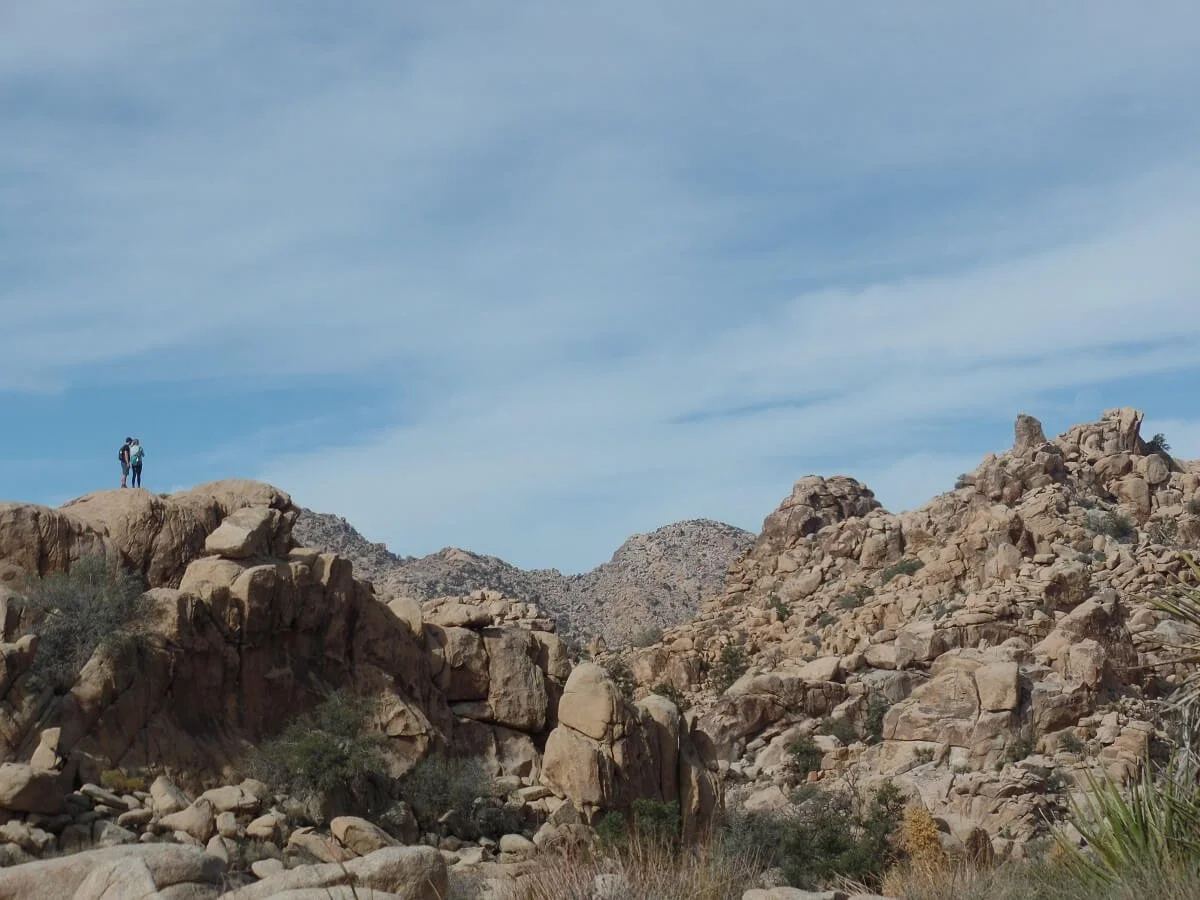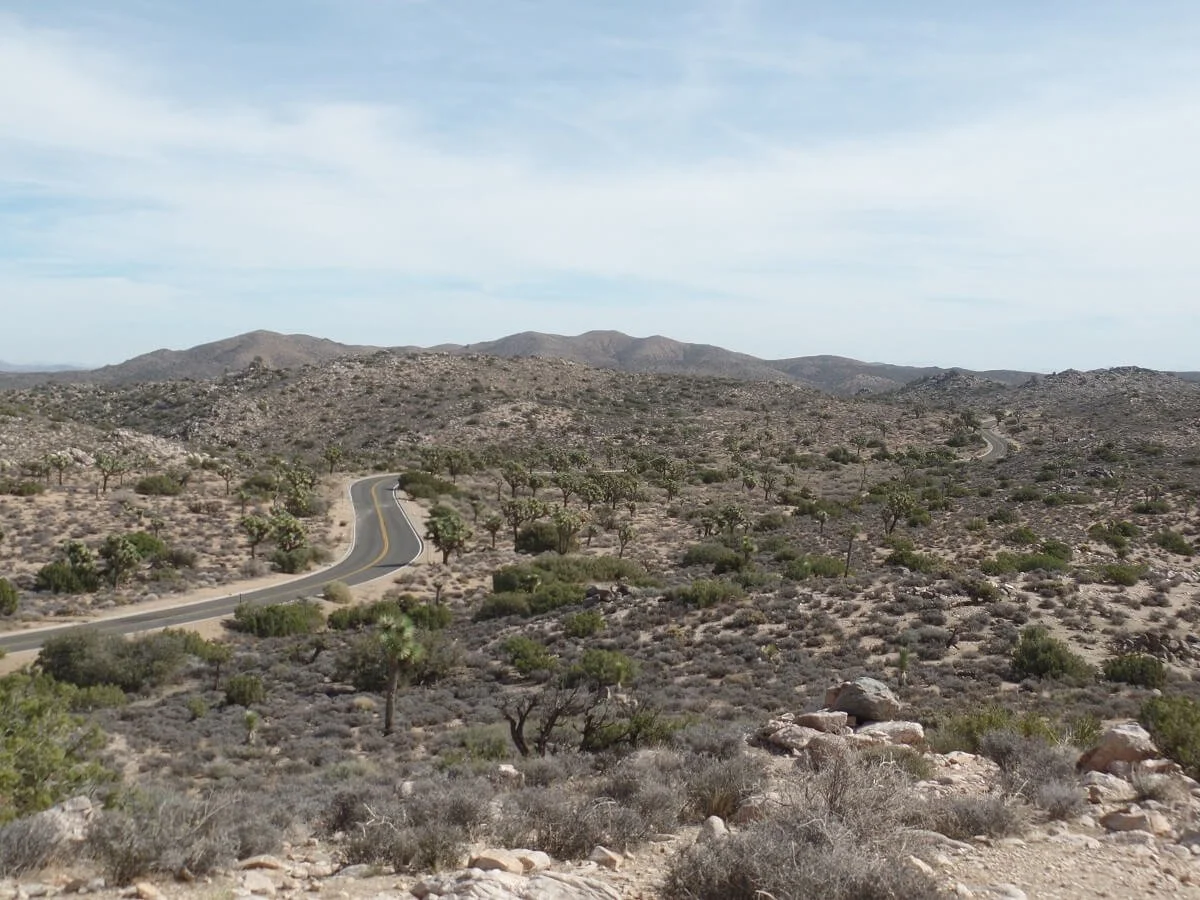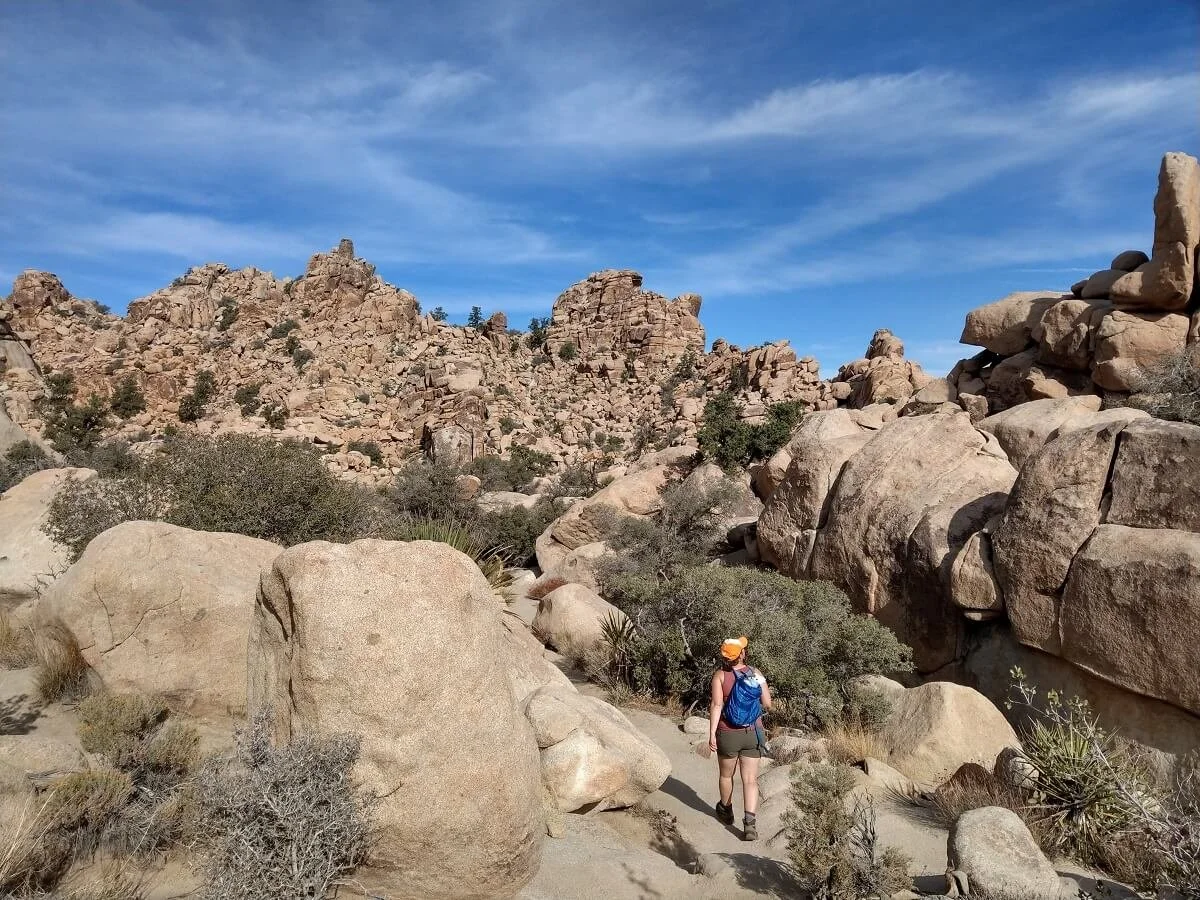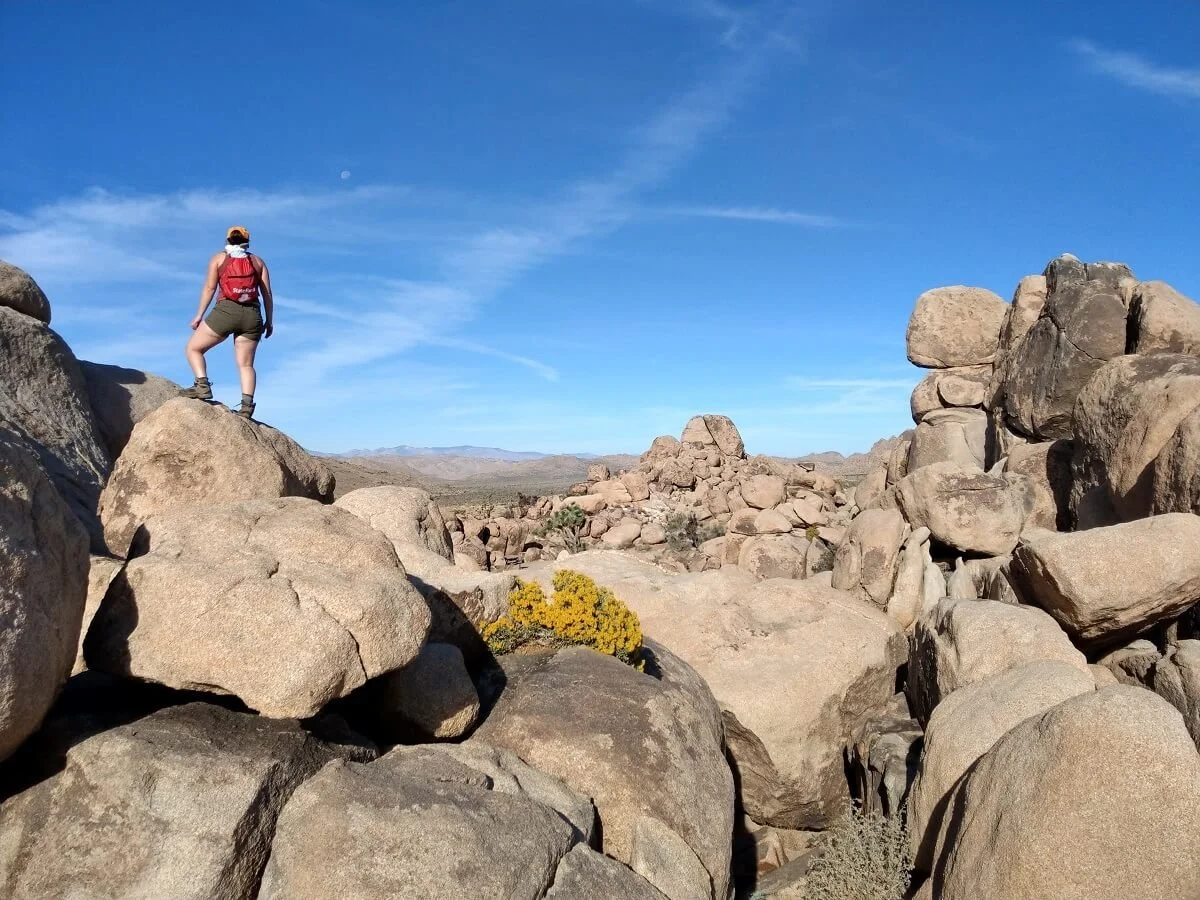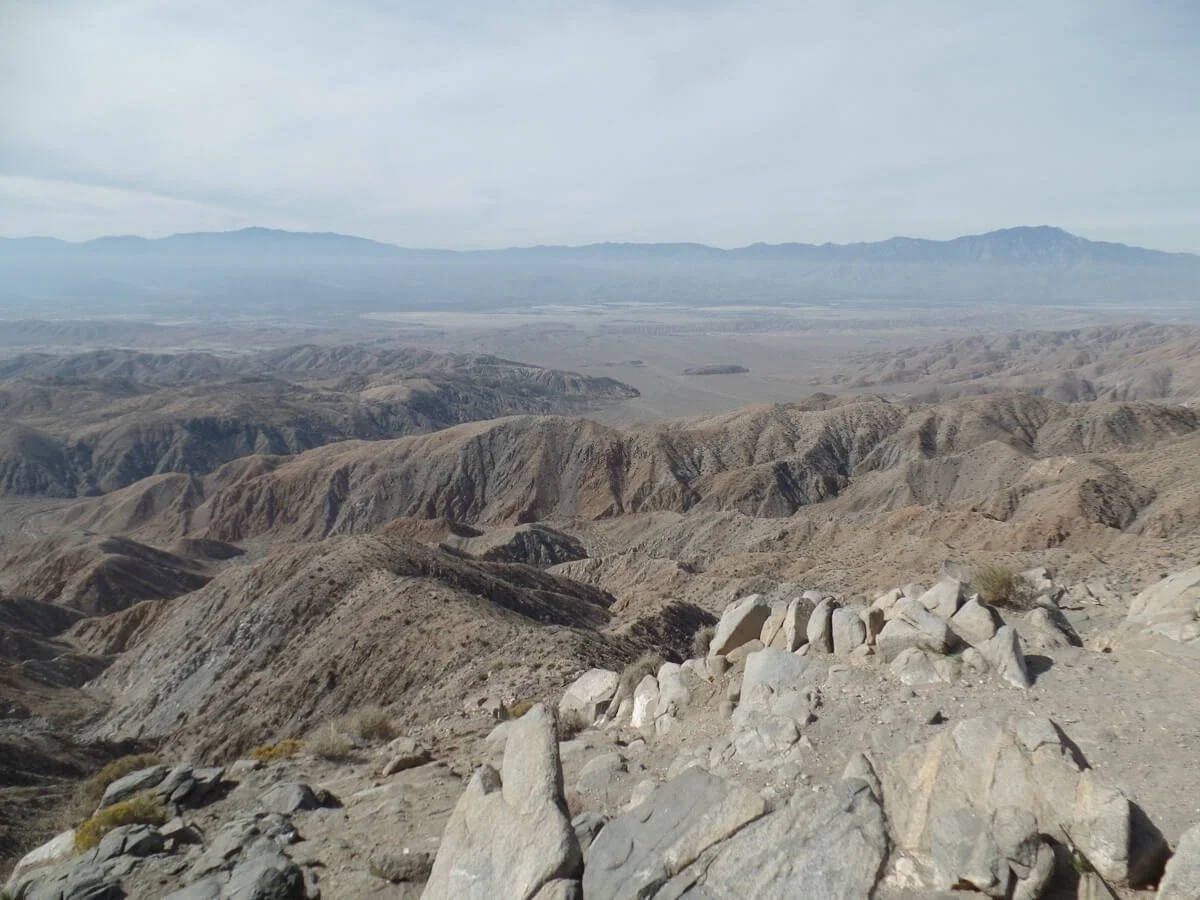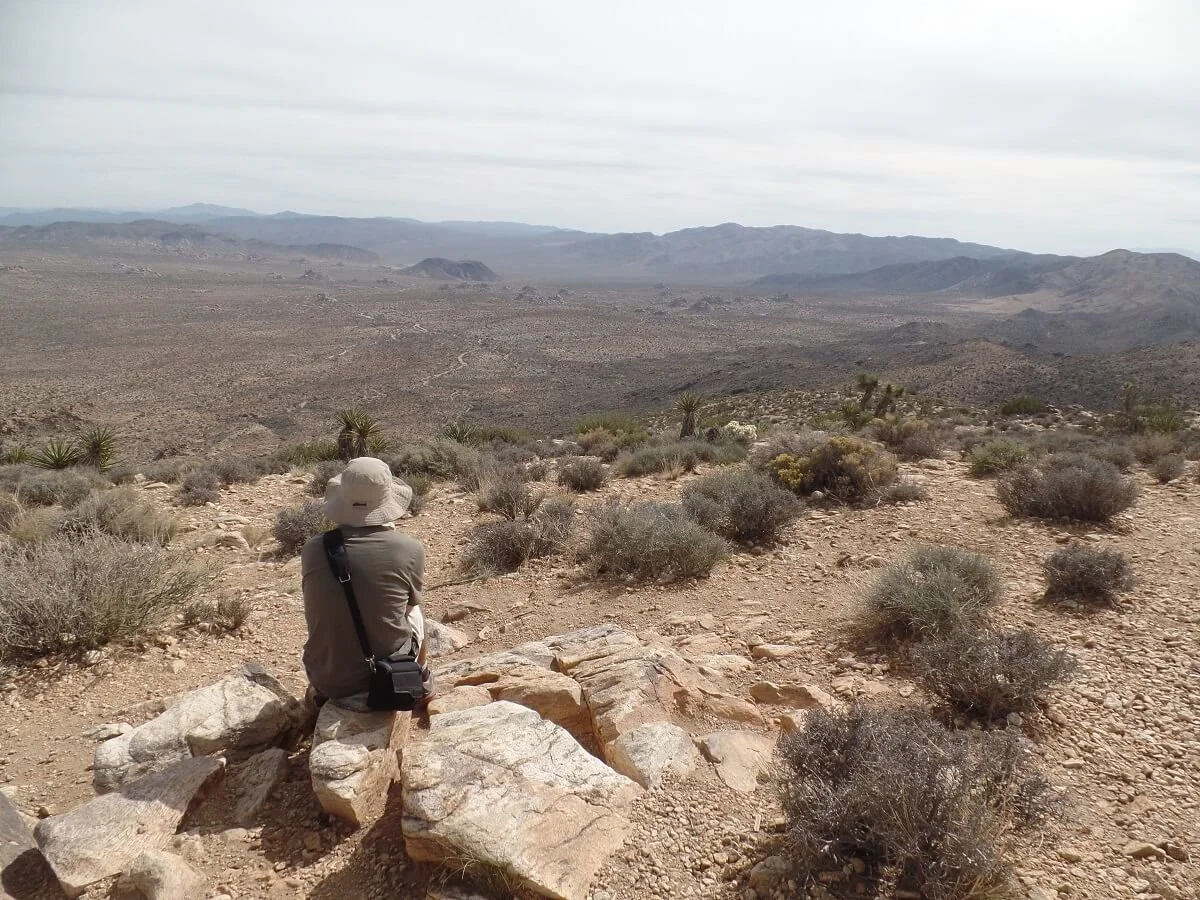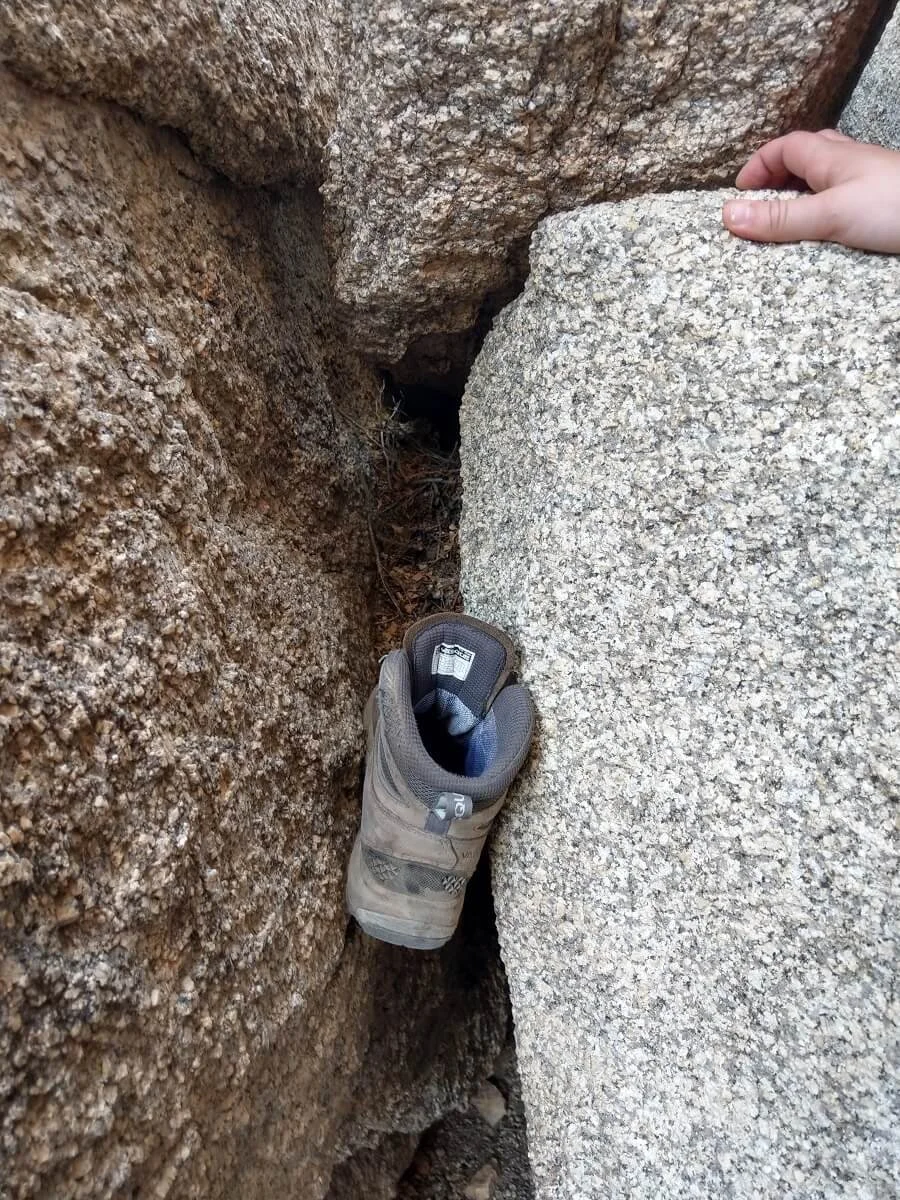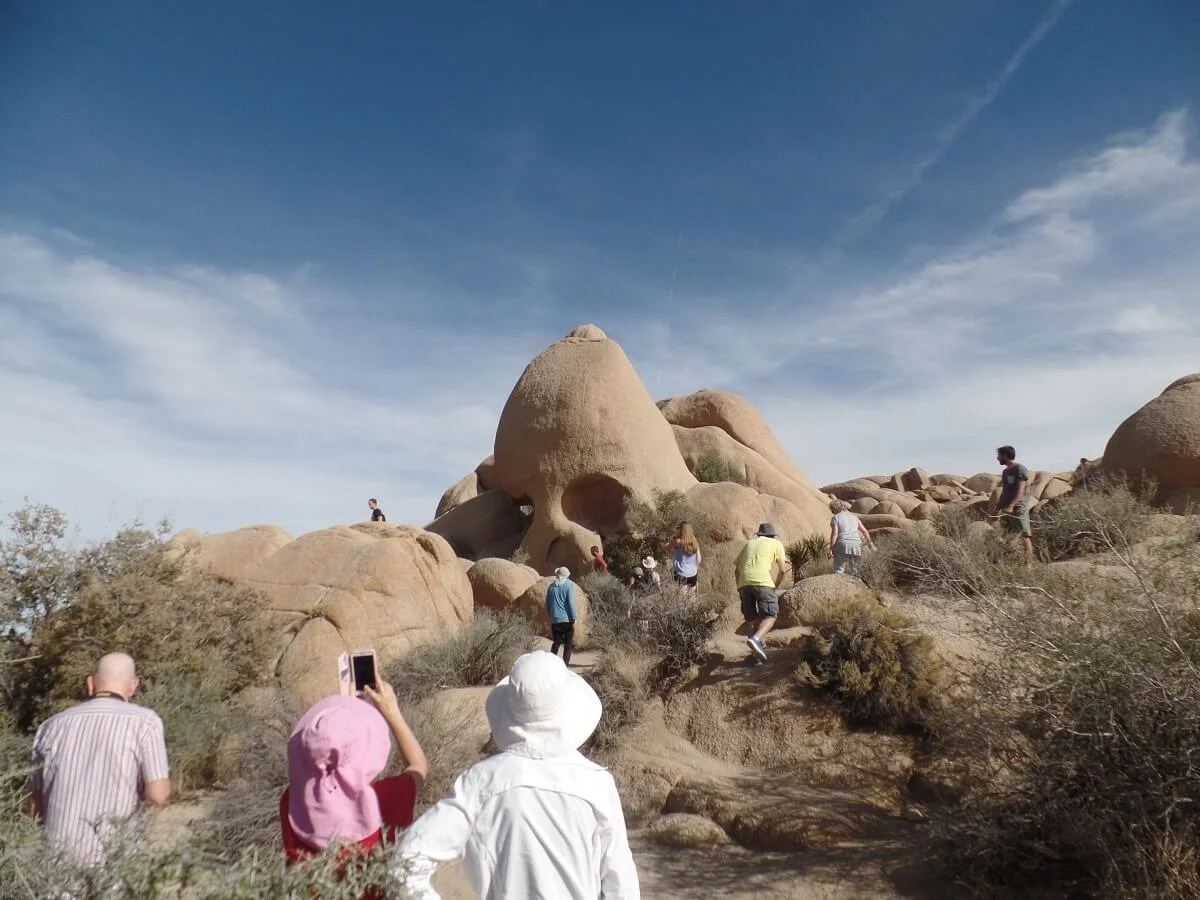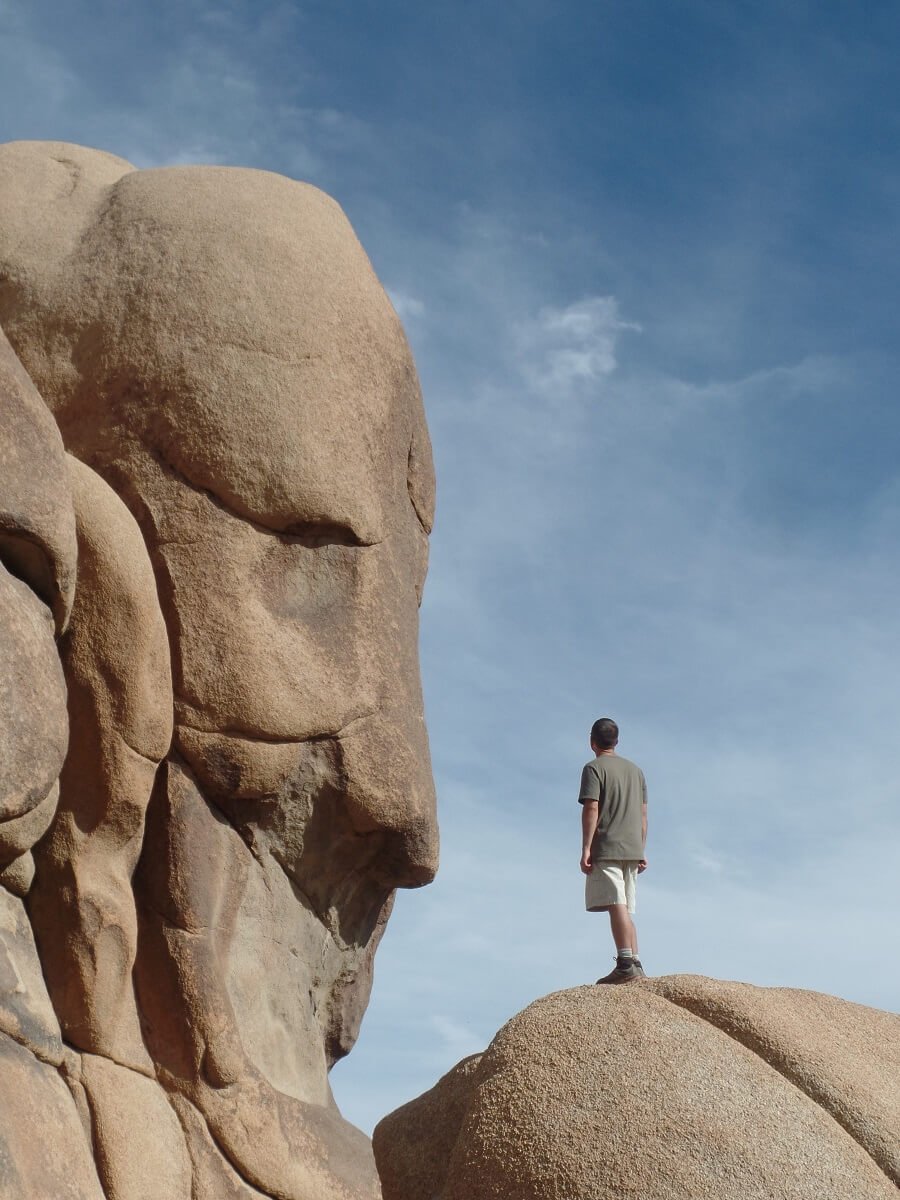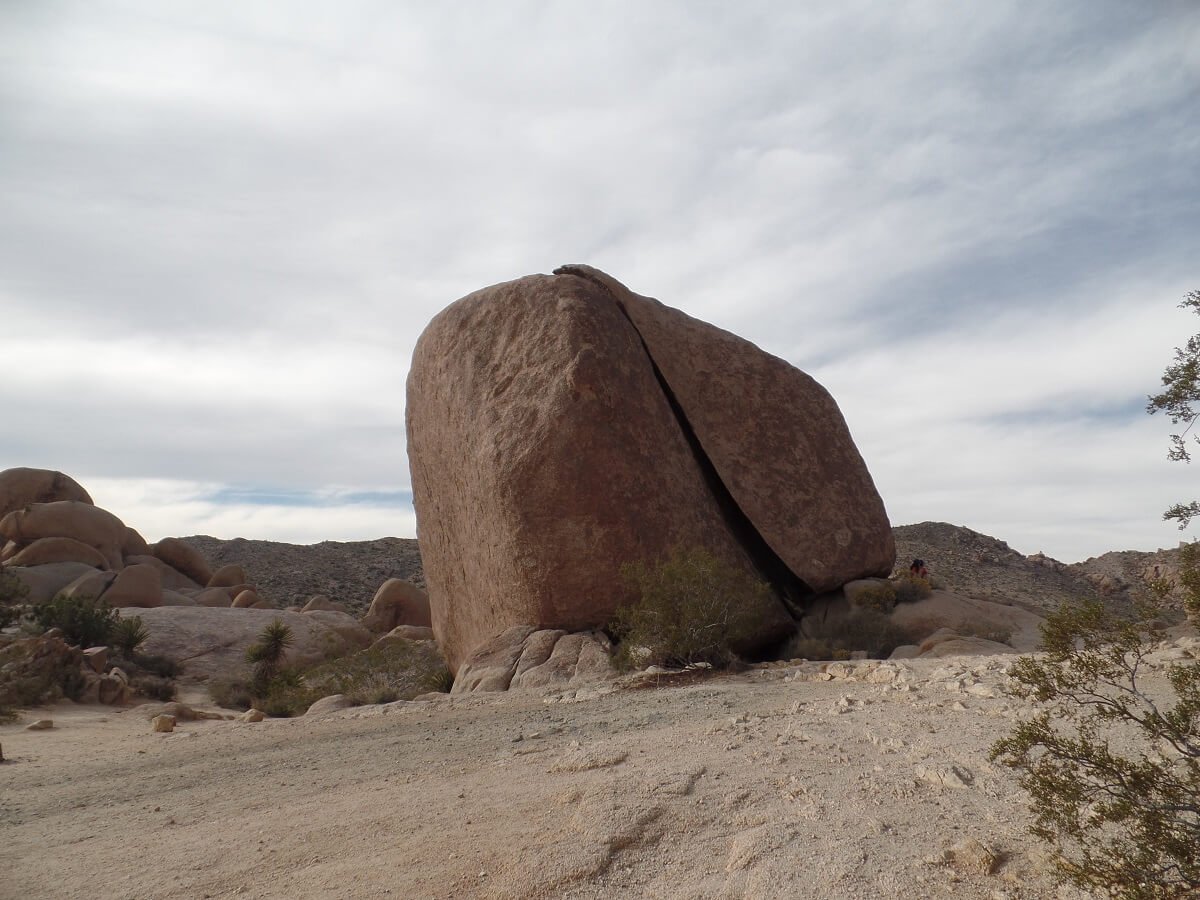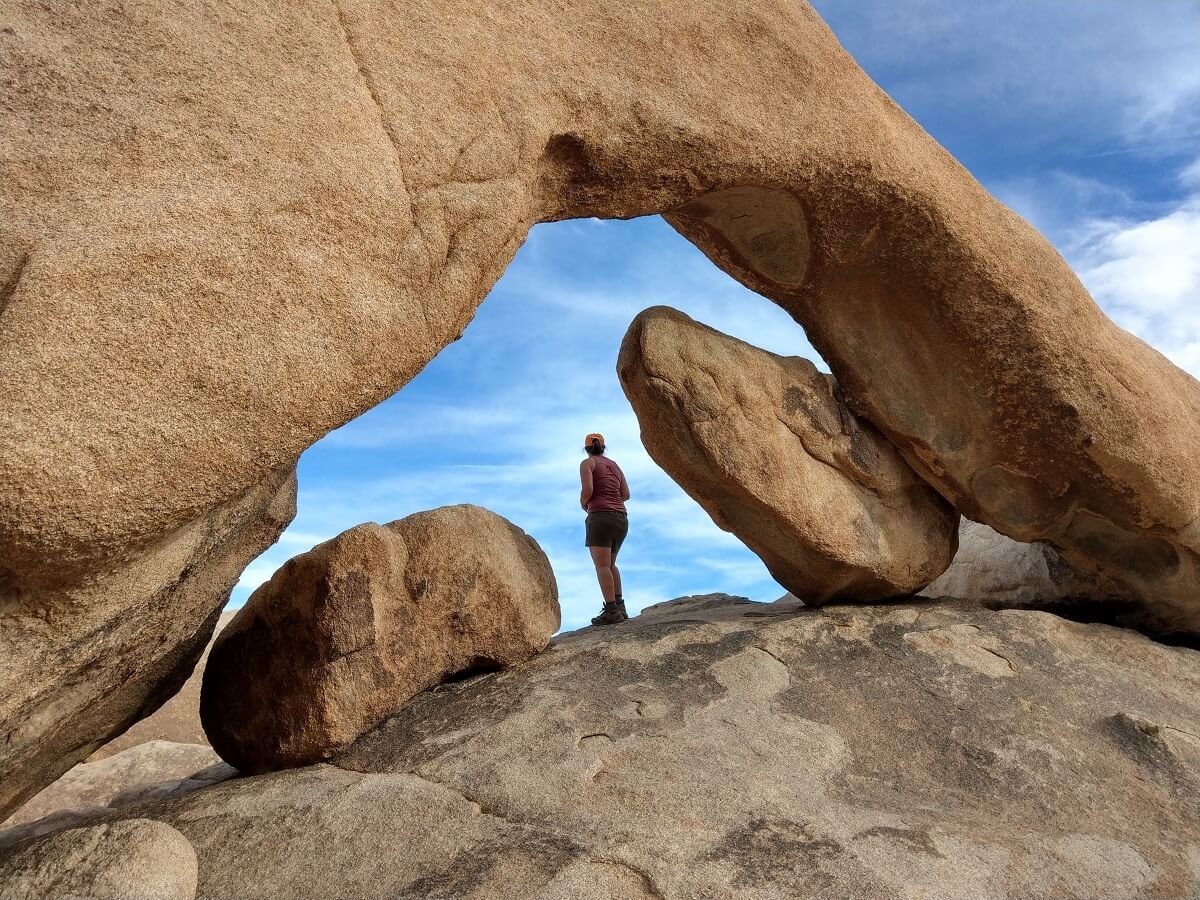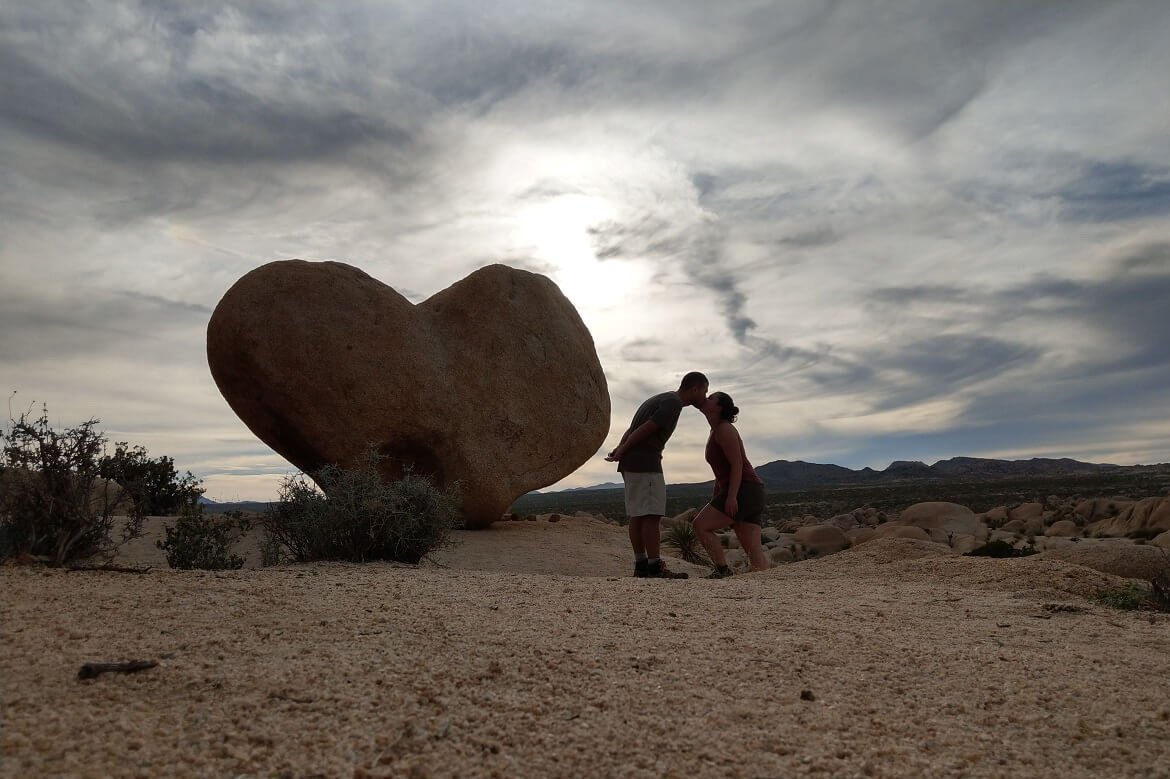One Day in Joshua National Park Itinerary: Best Things to Do, Map, and More!
Are you hoping to spend one day in Joshua Tree National Park and wondering how to plan it? We got you covered! In this guide, we’ll give you a Joshua Tree itinerary that is guaranteed to take you to all top sights in Joshua Tree that you can see in just one day. Plus, we’ll give you our best tips on things like where to stay, when to go, and more!
Just a hop, skip, and a jump away from major cities like San Diego and Las Vegas lies Joshua Tree National Park. Joshua Tree is one of the country’s most unique National Parks. It’s a giant outdoor playground of rock piles and boulders that offers a mecca for hikers, rock climbers, and any sort of outdoor explorer.
Joshua Tree National Park is an 800,000 acre landscape of pure desert wilderness. So, you might be asking yourself, how much time do I actually need in Joshua Tree National Park? Is one day in Joshua Tree enough?
We’re here to tell you that it absolutely is! Despite its size, we think you can definitely explore the top sights of Joshua Tree in just one day. And with its close proximity to major cities like Los Angeles, San Diego, and even Las Vegas, it’s easy to visit Joshua Tree on a day trip and see many of the park’s highlights.
Want to learn how?
In this guide, we’re sharing all the best things to do in Joshua Tree National Park in one day, from unique rock formations (there’s lots of them in Joshua Tree!), to beautiful desert hikes, and even a few Joshua Tree hidden gems! This Joshua Tree itinerary is the exact one we followed and is perfect for those looking to make the most of their one day in the park and hit all the must-see Joshua Tree attractions. We’ll also give you some tips on where to stay, when to go, and how to get there so you’ll be ready to pack your bags and hit the road in no time.
Let’s get right to it!
In this one day Joshua Tree National Park itinerary:
Where is Joshua Tree National Park?
Joshua Tree is in southern California, ideally positioned just 3.5 hours away from four major cities: San Diego, Los Angeles, Las Vegas, and Phoenix. If visiting any of these cities, a day trip to Joshua Tree is a great option! Many people also like to visit Joshua Tree for one day as part of a larger road trip through the area where they hit other popular places like Death Valley or the Anza Borrego Desert.
How to Get Around Joshua Tree National Park
Joshua Tree National Park actually has five different park entrances. Don’t worry, it’s less confusing than it sounds.
Two of the five park entrances are short roads with no visitor centers. They dead-end shortly into the park and lead to a limited number of hikes or activities. We won’t be focusing on these areas in this one day Joshua Tree itinerary.
The main entrance for Joshua Tree National Park used by most visitors is the West Entrance Station off of Route 62. This puts you right at the beginning of Joshua Tree’s main scenic drive, Park Boulevard. This Joshua Tree scenic drive cuts straight though the heart of the park. It’s where most of the top hikes and sights in Joshua Tree are found and what we’ll be focusing on in our Joshua Tree itinerary.
After about 25 miles into the Joshua Tree scenic drive, you have a decision point. You can choose to continue along Park Boulevard to the North Entrance Station, which will bring you right back out onto Route 62, just a little further down from where you started.
Alternatively, you can turn off of Park Boulevard and onto Pinto Basin Road. This road is a bit less traveled, and will bring you to the quieter, but equally scenic, southern portion of the park. While there’s not too much in the way of hiking out here, this road is ideal for sightseeing. By driving this road, you can watch the transition from Mojave Desert, with its piles of jumbo volcanic boulders and prickly Joshua Trees, to the Colorado Desert filled with Ocotillos and Cholla Cacti and flat desert washes. Traveling this way will bring you all the way down to the Cottonwood entrance and onto Route 10.
How long does it take to drive through Joshua Tree National Park?
West Entrance to North Entrance: This point to point scenic drive in Joshua Tree will end up being about 35 miles and take about an hour without stops (but trust us, you’ll be making lots of stops! Most of the best places in Joshua Tree are found along this route.).
West Entrance to Cottonwood: This Joshua Tree scenic drive is about 60 miles and would take 90 minutes without stops.
Of course, for this one day Joshua Tree itinerary, you won’t simply be driving straight through, so plan to spend the full day enjoying all of Joshua Tree’s best things to do!
Which way should I drive through Joshua Tree?
We think the best scenic drive through Joshua Tree would be to drive from the West Entrance to the North Entrance. Most of the best Joshua Tree attractions are found along Park Boulevard so starting at either end and completing this one-way journey from point to point is the perfect way to see a lot of highlights, especially with only one day in Joshua Tree.
In our Joshua Tree itinerary, we’ll take you down Park Boulevard, with a short detour onto Pinto Basin Road to make sure you see all the best places in Joshua Tree with your one day!
One Day Joshua Tree National Park Itinerary
So, what can you do in Joshua Tree if you only have one day? A lot actually! If you’re willing to have a jam-packed day, you’ll be surprised how many of Joshua Tree’s highlights you can actually squeeze in! So if you’ve been questioning whether Joshua Tree is worth it with only one day, we hope this itinerary convinces you that it absolutely is.
This one day Joshua Tree itinerary starts at the West Entrance and ends at the North Entrance (this can be easily reversed if needed). Without further ado, here are all of the best stops in Joshua Tree along Park Boulevard Road!
Hidden Valley
Walking through a maze of rocks on the Hidden Valley Trail in Joshua Tree
No, you won’t find the delicious ranch dressing here, but what you will find is an easy and flat 1 mile hiking loop that will take you through the iconic Joshua Tree landscape. It’s the perfect way to begin your Joshua Tree itinerary to get up close and personal to the famous trees and rocky landscape that make the park so unique. Feel free to wander around, climb on the rocks, and enjoy the views!
Quail Springs is an easy quick stop on a Joshua Tree itinerary
Keys View
Keys View is one of the best viewpoints in Joshua Tree. It’s at the end of a spur road off of Park Boulevard, but it’s worth the short detour. Without any hiking required, you’ll get amazing views over the vast Mojave Desert. The views combined with the accessibility of Keys View make this one stop that you cannot miss on a Joshua Tree itinerary!
Keys View is a must on your one day Joshua Tree itinerary!
Not the most exciting rock feature in the park, but an easy addition to your Joshua Tree itinerary nonetheless
Ryan Mountain
Next up on your Joshua Tree itinerary…Ryan Mountain! This is one of the best and most popular hikes in Joshua Tree, and for good reason. In a short distance (just three miles round trip), you are rewarded with panoramic 360 views over Joshua Tree. As a bonus, it’s a great place to spot Bighorn Sheep, so keep your eyes peeled! Though it’s a short hike, the trail does climb steadily, with a 1,000 foot elevation gain in just about 1.5 miles to the summit.
Enjoying the views at the summit of Ryan Mountain is a perfect way to spend one day in Joshua Tree!
Jumbo Rocks
The Jumbo Rocks area is an iconic Joshua Tree stop
We bet you can guess from the name what you’ll find at this Joshua Tree must-see. Yup… a bunch of jumbo-sized rocks! This really is just a giant playground of massive boulders that you can crawl, squeeze, and climb your way though. You can spend as much or as little time as you want just exploring and having fun. Just be sure to not lose your shoe like me!...
Skull Rock
Skull Rock is one of the most famous rock formations in Joshua Tree. It’s found right off Park Boulevard shortly after the Jumbo Rocks parking lot, and can be seen right from the road. There will be plenty of cars and people so it’s impossible to miss.
This iconic rock feature attracts a lot of people, so patience is key and you might have to wait a bit to get your picture unless you’re able to get here earlier in the morning or late evening after the crowds have dissipated.
Skull Rock is one of the most famous places in Joshua Tree! So come with a little extra patience!
There’s also a hiking trail here…the Skull Rock Loop. It’s a short 1.7 mile loop that passes that passes through the Skull Rock area from the Jumbo Rocks campground. It’s nice for exploring the area more if you wish, but the main attraction here is definitely Skull Rock.
Face Rock
Face Rock was absolutely my favorite spot on our Joshua Tree itinerary! It’s such a unique rock feature and remains a bit of a hidden gem of Joshua Tree. Even though it’s a short and easy walk, we were the only ones there!
The trail to Face Rock begins right across the street from Skull Rock, where the crowds of people will remain. The trail you’re looking for is the Discovery Trail. After less than two tenths of a mile down a flat sandy trail, you’ll come to the junction with the Face Rock Trail. Just a few more steps down this path and you’re there…easy peasy!
As you approach Face Rock from this angle, it doesn’t look anything like a face and you might walk by and completely miss it! So make sure you keep turning around behind you.
Split Rock
Split Rock is another famous Joshua Tree rock feature
This Joshua Tree rock feature has a well-marked parking and picnic area. The split rock can be seen right from here, but there’s also a longer hiking trail that connects with the Face Rock trail if you’re looking to do a bit more exploration. It’s a quick and easy stop with only one day in Joshua Tree.
Arch Rock
Arch Rock was one of our favorite stops on our Joshua Tree itinerary!
Yet another iconic rock formation in Joshua Tree, Arch Rock is probably one of the most recognizable features of the park and is definitely a must-see in Joshua Tree. To get here, you’ll turn off of Park Boulevard and head down Pinto Basin Road for just a few miles until you get to the White Tank Campground. There is a small parking area for the trailhead right in this campground that fits just a handful of cars.
The Arch Rock Nature Trail is an easy half mile loop that takes you to this famous rock arch. Just note that the arch is slightly off trail. It’s marked by a plaque but if you’re not paying attention, it’s easy to miss!
Heart Rock
Heart Rock is another hidden gem of Joshua Tree. We loved it because it’s an off the beaten path adventure that takes you away from the crowds and to one of the coolest rock features we think we’ve ever seen… a rock shaped like…you guessed it… a perfect heart!
How cool is this?! Definitely a must-do on any Joshua Tree itinerary…if you can find it!
What makes Heart Rock special (you know, other than the fact that it’s shaped like a heart!) is there is no trail to get to it, so it takes some effort and luck to find it. If you do find it, it might just become your favorite stop on your one day Joshua Tree itinerary.
Heart Rock is actually located off the Arch Rock Nature Trail. To get there, you’ll have to go off trail and search. It felt like a super fun treasure hunt in a sea of rocks, and when we found Heart Rock, it felt like we had stumbled upon a hidden treasure!
While we can’t give you an exact road map on how to find Heart Rock in Joshua Tree, we will give you this hint: you can actually see Heart Rock from the Arch Rock trail if you know what you’re looking for. If you look carefully out in the direction of the mountains, it’s there, and you can then scramble your way out to it. I would definitely recommend spotting it first and then hiking towards it, rather than wandering aimlessly through the maze of rocks without really knowing where you’re going…it can be easy to get lost out there!
Not too many people know to look for it, so there likely won’t be anyone else out there, which makes finding it that much more rewarding.
Cholla Cactus Garden
Walking through the Cholla Cactus Garden in Joshua Tree
This cactus patch is located a but further down Pinto Basin Road, but we think it’s worth the extra time to get to even with only one day in Joshua Tree. Here, you can walk a well-maintained trail through a giant maze of the Cholla Cactus, but be sure not to touch them! They are sharp and painful (we saw one guy not heed the warning and gave himself quite a gnarly hand injury). It’s a great short walk that gives you a glimpse of some more diverse vegetation other than the iconic Joshua Tree that makes the park so famous.
Once you’re done with the Cactus Garden, it’s time to turn around and make your way back to Park Boulevard. You can either drive to the North Entrance to complete the loop and do a bit more sight seeing or backtrack the way you came back to West Entrance. Either way, that’s a wrap on your one day Joshua Tree itinerary!
Joshua Tree One Day Itinerary Map
This Joshua Tree map is from the park’s brochure. We’ve highlighted with blue boxes all the places we mention in this one day Joshua Tree itinerary along with the direction of travel down the park roads.
More Than One Day in Joshua Tree: Things to Do
If you have more than one day in Joshua Tree, then there is plenty more to keep you busy! Even if you don’t, while we think our Joshua Tree itinerary above covers all of our personal favorite spots in Joshua Tree, you may want to replace something in it with one of these attractions instead!
Learn about Joshua Tree’s mining history
Joshua Tree has a rich history in mining, ranching, and homesteading. There are several area in the park where you can get a glimpse into this history, either through short hikes or guided ranger walks.
Barker Dam – explore a water tank built by early cattle rancher on this 1.1 mile trail.
Keys Ranch – restricted to 90 minute tours to preserve its history, learn the story of William F. Keys.
Ryan Ranch – a 1 mile hike to an old adobe structure.
Lost Horse Mine – a 4 mile moderate hike to a gold mine.
Visit a Desert Oasis
There are several areas in Joshua Tree that hold an oasis of fan palm and Cottonwood Trees that can give hikers of all levels a glimpse of the more diverse vegetation in the park (and offer some shade relief from the sun!).
Oasis of Mara- an easy half mile trail at the Oasis Visitor Center.
Cottonwood Springs- an easy ten minute walk through an oasis of fan palms near the Cottonwood Visitor Center.
Fortynine Palms Oasis – a 3 mile out and back hike to another fan palm oasis if you’re looking for more of a challenge than Cottonwood Spings.
Lost Palms- a half day trek through washes, into a canyon, and to a remote fan palm oasis
Take a backcountry drive
Geology Tour Road is an 18 miles scenic drive through Joshua Tree National Park that twists though the landscape and offers informational stops along the way. It’s a dirt road, and after a few miles in, a 4x4 is highly recommended.
Camp in the backcountry
Backpacking is not a common thing to do in Joshua Tree, and there is a limited long trail system, so if you’re looking for solitude, you’re bound to find it here. Permits are required but are free and simple to get (you register at the trailhead at the beginning of your hike).
Best Time of Year to Visit Joshua Tree National Park
The best time to visit Joshua Tree is between October and May, when day time temperatures are tolerable (in the 80s) and nights get comfortably cool (in the 50s). Spring has the least amount of rain, although it doesn’t really rain here very often any time of year.
In the winter, day time temperatures are nice for hiking and exploring, but keep in mind that the nights can get below freezing.
Summer is a time you probably should not visit Joshua Tree. It is often too hot to do anything other than enjoy the park from your air-conditioned car, since summer temperatures can reach into the triple digits here. And while the seeing the scenery from the road is still beautiful, your time in the park will be quick and you’ll miss out on a lot of cool hikes! Keep in mind that some campgrounds and facilities may be closed in the summer as well.
If you do come in the summer, avoid anything strenuous, and keep most of your outdoor activity for the morning or evenings to avoid the midday heat.
Where to Stay in Joshua Tree National Park
We only spent one day in Joshua Tree doing activities, but we stayed the night there beforehand to be able to get up early and make the most of our one day. Spending the night here means you’ll be right next to all the best things to do in Joshua Tree! Another great thing about spending the night in Joshua Tree is that this is actually an International Dark Sky Park! So if you want to see the Milky Way better than you ever have before, we recommend spending the night!
It's important to note that there is no lodging (other than camping) inside Joshua Tree. The Yucca Valley and Palm Springs areas near the park are good options for those looking to stay close by in Airbnbs or hotels.
Camping in Joshua Tree National Park
Camping in Joshua Tree will allow you to see some amazing sunsets!
Joshua Tree National Park has 8 campgrounds (and one group camping site).
Five of these Joshua Tree campgrounds require reservations: Black Rock, Cottonwood, Indian Cove, Jumbo Rocks, and Ryan. Many of these are primitive sites with only a pit toilet and no drinkable water. Make sure when you book you know the type of site you’re looking at and come prepared with plenty of water and supplies. These sites range from $20 to $25 per night.
Book as early as you can (up to 6 months in advance). Joshua Tree has gotten popular so if you’re looking to snag a spot on a weekend or holiday especially, try to book early.
Three of Joshua Tree’s campgrounds are first come first served: Hidden Valley, White Tank and Belle. These are $15 per night…there’s no self-registration system, though. Instead, a ranger will come around during the day and collect payment.
Counting on just coming to the park and snagging one of these sites is a bit of a gamble. They can fill up fast on weekends, holidays and also even weekdays in the peak months of Spring (February to May). The earlier you get to one, the better your chance. We went to Joshua Tree on a Sunday in early November and couldn’t find any available camping in the park. So, there’s a fairly good chance that, without a reservation, you won’t be lucky enough to snag a site.
If you can’t score a campsite in Joshua Tree, there are a few private RV sites and campgrounds outside of the park.
Free camping near Joshua Tree
Just outside both the north and south edges of the Joshua Tree National Park, there are dispersed camping areas managed by the BLM. This is free camping! Within the designated areas, you can camp anywhere. Just keep in mind it is completely primitive, with no restrooms, water, or any facilities, so make sure you come prepared and pack out everything you pack in.
The area to the north of the park was a bit popular, and quite loud. Don’t expect a peaceful wilderness experience here, and if you want to head to bed early, bring ear plugs. The roads in are also a bit washed out and have lots of potholes, so drive carefully. We drove here in the night and struggled to see the layout and where to go, so I would suggest arriving when it’s still light out to get your bearings and a better sense of how things are set up.
The area to the south is much larger and with more well-defined camping sites. When we were there, it was much less crowded and completely quiet and quite an enjoyable experience!
Tips for Visiting Joshua Tree National Park in One Day
Cost. A Joshua Tree park pass costs $30 per vehicle, but lasts up to 7 consecutive days. You can buy one online before you go, or in person at one of the park entrances.
Water. No matter what time of year you visit Joshua Tree, be sure to have plenty of water. It gets hot and dry during the day and you should be going through a lot, especially if you’re hiking. The only places to get drinking water are at the visitor centers and entrances of the park, so fill up!
Sun protection. Sunscreen, hat, sunglasses, and long sleeve clothes are highly recommended out here.
Sturdy hiking shoes or boots. If you want to hike around this rugged and rocky landscape, having hiking shoes are best so you don’t roll an ankle or destroy your feet.
Layers. If you plan on spending the night or you want to just stargaze for a bit before heading out, it can get a bit chilly depending on the time of year you’re here.
Timing your hikes. Get bigger hikes in the early morning or later in the evening to avoid the midday heat, especially in the hotter months in or around summer.
Have a backup plan to spend the night. If you plan to find a last minute camping site, be prepared to shell out some extra cash in a private site out side the park, or camp free at a primitive site outside the park.
Food. There are no restaurants or stores in the park, so bring plenty of food and snacks with you!
Cell service. You likely won’t have any in the park, so be sure to download all relevant maps, reservations, and passes before you go!
Be respectful. The vegetation, especially the famed Joshua Trees, are highly fragile. Do not touch or climb on them and don’t attach or hang any sort of ropes off of them, such as those for hammocks. Remember to leave no trace and pack in what you pack out!
More Things to Do Near Joshua Tree
Looking for more things to do after spending one day in Joshua Tree National Park? Check out our other California travel guides for inspiration!
Best Things to Do In Death Valley and Ultimate Trip Guide
Perfect One to Three Day Death Valley Itinerary
How to Hike the Golden Canyon Gower Gulch Loop: Death Valley’s Best Hike!
Driving Titus Canyon Road in Death Valley For the Best Views of the Park
We really hope this article helped you plan out your one day Joshua Tree National Park itinerary. Even with a limited amount of time, you can still see so many of the best sights in Joshua Tree! Let us know if you have any questions, or if you have a favorite spot that wasn’t included here!

